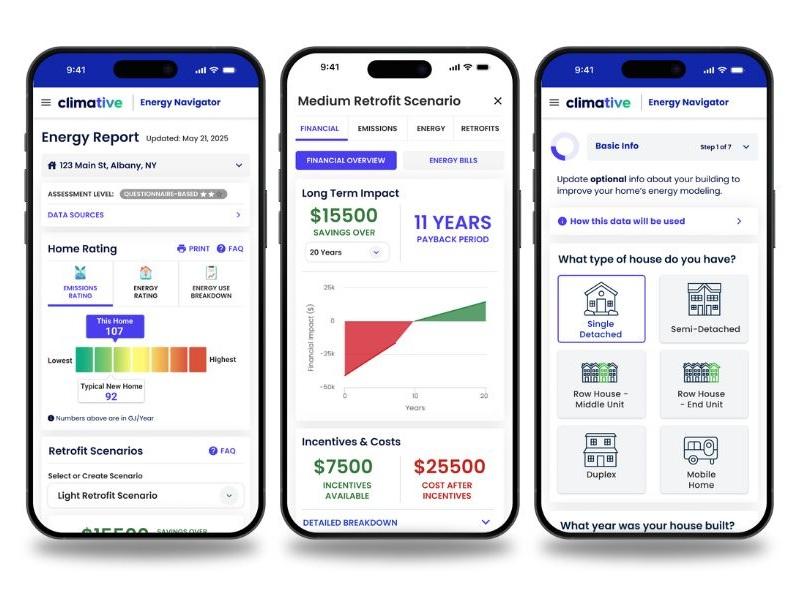
Through its artificial intelligence (AI)-powered product suite, Fredericton-based Climative Inc. helps building owners with their bottom lines, increases occupant comfort and improves sustainability, CEO Winston Morton said.
By compiling data from AI models, property assessment forms, surveys and utility data, Climative’s platform will crunch the numbers to suggest carbon-lowering retrofit options for a building owner based on their priorities. These can include envelope improvements, HVAC updates, fuel switching and other measures.
“If your priority is to save money, our system will organize the advice to optimize financial savings,” Morton said in an interview with Sustainable Biz Canada. “You can also optimize comfort, you can optimize emissions.”
Under his leadership, the company landed on Foresight Canada’s 2024 Foresight 50 list which recognizes investable cleantech ventures. Morton was also named one of Canada’s Clean16 in 2024 by the Clean50 Awards, acknowledging his contributions in sustainability for the technology, telecom and media category.
Since its founding in 2014, Climative has grown to having almost 10 million buildings on its platform, Morton said, and counts clients in Canada and the U.S. While Canada remains its biggest and legacy market, the U.S. will be taking a bigger slice of its attention in the coming months.
Practical energy advice for homeowners
Founded in 2014 under the name SimpTek Technologies by three engineers from the University of New Brunswick — Keelen Gagnon, Lionel Fernandes and Asif Hasan — the company initially worked with utilities to help consumers better understand their energy use.
Morton joined shortly after its formation, as an advisor and investor. As the firm evolved, it recognized utility customers were most interested in learning how their energy use affects them in a practical sense, such as powering air conditioning and the electricity that keeps the lights on.
“The value proposition that’s provided to a homeowner, particularly to help them conserve energy and more recently be more resilient in their homes, needs to be put in context to be meaningful to the customer," Morton explained.
Climative also saw the need to engage with homeowners, not just utilities, to hasten the pace of decarbonization in the buildings sector.
It pivoted to show building owners and project managers how to achieve “triple-bottom-line benefits” as Morton described, a solution that allows the client to save money, boost comfort and resiliency, and cut carbon emissions. Aided by AI, which it was using “long before it was cool” Morton said, Climative generates custom retrofit plans for every building to meet this purpose.
Its main offerings to achieve this are Insights, Navigator and Advisor:
- Insight is used for energy and carbon data analysis of buildings, regional data aggregation, impact reporting and tracking.
- Navigator is Climative’s customer engagement platform that provides retrofit advice and offers, and tracks the outcomes of the building upgrades.
- Advisor is a platform for energy advisors equipped with retrofit modelling tools and building owner reports.
AI will change energy efficiency projects

Climative has found clients for its technology in the residential and commercial building sectors. Morton said these include: administrators of energy efficiency programs, such as municipalities aiming to raise citizen awareness of climate issues; provincial and state governments; utilities with demand response or energy efficiency programs; and banks and insurance companies.
In Canada, government clients include the province of Prince Edward Island and the City of Ottawa. New Brunswick Power is a utility customer. Efficiency Nova Scotia, a non-profit, is another user of Climative’s platform.
Climative’s platform has developer over five million low-carbon plans. Market coverage has effectively doubled every year for the past three years, Morton said, indicative of its quick ascent.
AI has been highly valuable as it enabled Climative to significantly accelerate the speed of deployments, Morton said. If done manually, the company would be limited to producing a handful of building assessments per week, costing $600 to $800 per report. By contrast, “we can do over a million assessments per day” with AI, Morton said, which scales its capabilities to the national level.
Used in such fashion, AI will “change the way energy efficiency and emissions reduction projects are done today,” he continued. Long-standing business models will also be swept aside, he argues.
The U.S. has emerged as a key market for Climative since it began servicing the country last fall. A major project in the Northeast U.S. will be announced later this year, Morton added.










